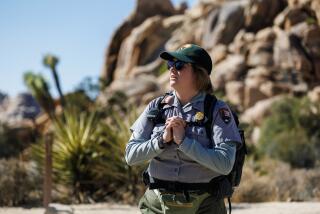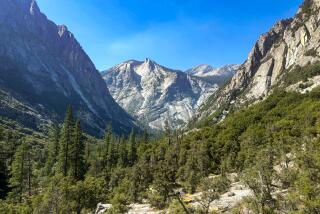The Safe Outdoors : Recreation: Some find that the answer to a trouble-free family outing is to forgo public parks for a privately run operation. : Valley Summer: A weekly look at life in the heat
There is a local park where families can still picnic in peaceful surroundings, far from the unsettling presence of gangs, graffiti, drug sales and competing boomboxes.
And it’s all available to the public. For a price.
On a recent weekend at Soledad Canyon Preserve, near Acton along the Santa Clara River, kids frolicked in the swimming pool or gathered around ponds to feed the geese and ducks, men and women played cutthroat games of horseshoes, couples practiced line dancing in the main recreation hall and retirees played cards at picnic tables. There were hundreds of people in the park, but still ample space in its 226 acres for quiet strolls through grassy fields shaded by graceful eucalyptus trees.
Soledad Canyon is part of the Thousand Trails system of membership parks owned and operated by the Texas-based U. S. Trails company. The 39 parks in the nationwide system are aimed at recreational vehicle owners.
But anyone with the initiation fee--which now costs at least $1,000--plus several hundred dollars in yearly dues, can join up.
For some retired people, who make up a substantial portion of the Thousand Trails membership, it’s a way of life. “We have a house in Simi, but we are never there,” said Carl Crugnale, who has been a member since the Soledad park opened in the 1980s (the park has been through so many changes in ownership and management, no one on the staff could remember the exact year it began operations.)
Crugnale, 69, is a retired quality engineer for Pentagon. He and his wife essentially live in the Thousand Trails system and even volunteer their time to supplement the staff. One afternoon, he worked a shift in the snack bar while his wife taught line dancing.
“We like this type of life,” he said, flipping a hamburger. “I’d recommend it to anybody.”
On the other end of the spectrum are day users who don’t own an RV.
“You can’t take your family to a park in the city,” said Juan Mejia, 46, a Palmdale auto body repairman who has been a Thousand Trails member for two years. He was at the Soledad park that weekend with his family to picnic and celebrate his brother-in-law’s birthday.
“Too many problems with the drugs and the gangs in the city parks. It just isn’t right,” he said, taking a break from a friendly game of horseshoes.
With his membership, Mejia, his family and guests can visit any of the parks in the system, including 10 others in California. But they had only been to Soledad.
“We live only 15 minutes away, so we can come here weekends,” he said. “This is still like the old-fashioned family parks.”
The general manager of the park, Doug Cole, came by on his bicycle.
“One of our biggest selling points is security,” said Cole, who transferred to Soledad from another U. S. Trails park in New Jersey last year.
“We have occasional problems with vandalism or something like that, just like any other place. But one look around and you can see it is a lot more peaceful than what parks in cities, even small cities, have become.”
This was appreciated by those who come to the park but have little interest in picnicking or hiking. “We can play cards all night and get as drunk as we want, and then not have to worry about driving somewhere,” said Ed Demrest of Canyon Country, who works as a driver in the movie business.
He and a group of friends who regularly meet at the park were gathered in the RV area, getting ready to shoot pool at the Adult Lodge recreation hall. They were hoisting the first of many of that day’s Budweisers.
“We can’t hurt other people, we can’t hurt ourselves,” Demrest said. “The worst we might need is a designated walker.”
There was no need to ask one of his buddies, Richie Reiders, 60, of Ventura, what sports team he followed. The license on his RV read NYGNTSI and worked into the stained glass window on the door was the logo of the New York Giants.
Although Thousand Trails refers to overnight stays in the park as “camping,” it’s hardly roughing it. Reiders proudly pointed out the satellite dish on top of his RV.
“I never have to miss a game,” he said.
RV users have numerous parks to choose from in Southern California, some private and others operated by various government agencies. But few have amenities as plush as Soledad, which include two pools, tennis courts, two recreation halls, a fishing pond, a coin laundry, and a low-tech miniature golf course. “We’d like to have one with windmills and all that stuff,” said Cole, looking over the course, consisting of Astroturf-like fairways framed by unadorned concrete. “But we always have to think about maintenance.”
There are 850 RV sites, complete with hookups for electricity and water. Reiders likes the fact that the yearly Thousand Trails fee takes care of all costs. “Every time you go to a state park you pay through the nose,” he said.
But there is trouble in this RV paradise. Thousand Trails, which now has about 160,000 members in North America, has a rocky history and is going through an unsteady present.
The company was started in 1969 by Milton Kuolt, who at the time was an executive at Boeing. Frustrated with crowded and deteriorating public camping facilities, he started a membership park south of Seattle.
By 1976 he had added a second park and was taking in more than $1 million a year. In 1979 his company went public and, in the go-go economy of the 1980s, Thousand Trails exploded in size, eventually spreading to 22 states and one Canadian province.
There were mass mail campaigns--complete with offers of bicycles and other gifts for those willing to at least check out a Thousand Trails park. Roy Rogers signed on as official spokesman.
By 1975, memberships were going for almost $7,000.
With such phenomenal growth, the company attracted the attention of companies playing the investment venture game. In 1987, Thousand Trails was acquired by real estate giant Southmark of Dallas.
But the recession hit Thousand Trails hard. Southmark went bankrupt. Income from membership sales dipped far below the costs of the sales campaign and many members stopped paying their yearly dues, Cole said. In 1990 alone, Thousand Trails ran a $133.3-million deficit.
Some parks were closed, others went on a limited schedule. Soledad cut its staff from 60 to the current level of about 40. The park’s horse stables and some other amenities were closed. A few minor fees were added--the Saturday-night country music dances that are one of the most popular attractions at Soledad now cost attending members $1 admission so that the band can be paid.
Most memberships are now purchased from people who bought during the early years but who no longer are interested in belonging and want to cash them in. The going rates, Cole said, range upward from $1,000. Yearly fees, based on when a membership was purchased, range from about $150 to $350.
The company has asked its members to voluntarily up their annual membership fees by $100 and more if they make heavy use of the park. Cole said that so far, about 20,000 of the members have signed up for this program, which the company said it needs to keep the parks opened and well-maintained. The company is about halfway to its goal of about $4 million.
The long-range prospects for the system lie in attracting younger people into the program, Cole said. Most of those attending Soledad that weekend were in their 50s and upward, some with children and grandchildren in tow.
But there were exceptions. Paul O’Connor, 30, of Torrance was there with a group of friends, one of whom had a membership. “I love it, I could get addicted to this place,” he said, catching his breath after learning the cowboy boogie line dance.
His friend, Lori Durie, 32, was a bit more reserved. “When we came in I did notice there were a lot of older people,” she said. “But when you are dancing, it doesn’t really matter.
“Besides, this is a lot less work than real camping.”
More to Read
Sign up for The Wild
We’ll help you find the best places to hike, bike and run, as well as the perfect silent spots for meditation and yoga.
You may occasionally receive promotional content from the Los Angeles Times.







